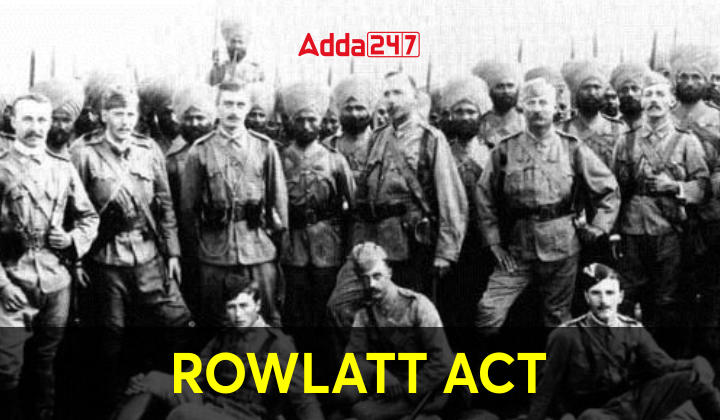Table of Contents
Rowlatt Act 1919
- In February 1919, the British Legislative Council passed a law called the Anarchical and Revolutionary Crimes Act, also known as the ‘Rowlatt Act.’ This law allowed the government to arrest people suspected of trying to overthrow British rule without giving them a trial for up to two years. They could even be executed without a jury.
- The Rowlatt Act was suggested by the Rowlatt Commission in 1918. It replaced an older law called the Defense of India Act from 1915. The new law gave the British government more power over Indians.
- Mahatma Gandhi didn’t like the Rowlatt Act. He called it a “Black Act” because it was unfair. His opposition to the law led to the terrible Jallianwala Bagh Massacre in April 1919. In response, the Indian National Congress started the Non-Cooperation Movement.
- Finally, in March 1922, the British Government got rid of the Rowlatt Act and twenty-two other laws. They did this after listening to the suggestions of the Repressive Laws Committee.
Rowlatt Commission
The British Government appointed the commission in 1918. Sir Sydney Rowlatt led the commission, with other members including J.D.V Hodge, Basil Scott, Verney Lovett, PC Mitter, and CV Kumaraswami Sastri. The commission aimed to examine the revolutionary activity in India and develop a policy for detentions. It suggested detaining or imprisoning revolutionaries without trials.
Rowlatt Act 1919 Provisions
- The Rowlatt Act, enacted in February 1919, granted the police authority to search homes and detain or arrest suspected individuals and political activists without warrants or trials. It established a special tribunal dedicated solely to the trial of those arrested.
- Three high court judges would preside over the tribunal, with no provision for legal aid for the arrested individuals. Trials would be conducted in secrecy, and any judgments made by the judges would be final, with no possibility of appeal.
- The tribunals could admit all types of evidence, even those deemed invalid under the Indian Evidence Act. Additionally, the British Government gained the power to tightly control the press and monitor revolutionary activities.
Rowlatt Satyagraha
- The Rowlatt Satyagraha marked the first comprehensive nationwide uprising against British Rule, distinct from the incomplete Revolt of 1857. The Rowlatt Act faced opposition from nationalist leaders and the general populace, stirring widespread discontent against British governance throughout India.
- Indian elected representatives of the Legislature, such as Mazhar Ul Haq, Madan Mohan Malviya, and Md Ali Jinnah, resigned from the council after voting against the bill.
- Mahatma Gandhi spearheaded the Rowlatt Satyagraha in protest against this oppressive legislation. In February 1919, he established the Satyagraha Sabha and urged for mass protests across India, rallying peasants and artisans for political solidarity.
- Anti-colonial demonstrations emerged in various regions even before the formal launch of Satyagraha. The Punjab witnessed the brutal Jallianwala Bagh massacre during one such protest, a horrific event that deeply shook the nation. In response, a larger-scale movement emerged in 1920 known as the Non-Cooperation Movement, which merged with the Khilafat Movement, significantly bolstering the Indian freedom struggle.
Hunter Commission
British Government to investigate the wrongdoings of the Jallianwala Bagh incident appointed a commission named Hunter commission on 14th October 1919. It was a 7 membered commission under the chairmanship of Lord William Hunter. The commission submitted its final report on March 1920, in which it condemned the act of General Dwyer. However, it did not impose any penalty or took any disciplinary action against General Dwyer.
Jallianwala Bagh Massacre
- Following the enactment of the Rowlatt Act, two nationalist leaders, Dr. Satyapal and Saifuddin Kitchlew, were arrested on April 9, 1919, while addressing a meeting. This event exacerbated tensions in Punjab, sparking riots and protests against the Rowlatt Act.
- Martial Law was enforced in Punjab, prohibiting gatherings of more than four people. On April 13, 1919, during the Baisakhi festival, a peaceful crowd assembled in a public garden in Amritsar.
- Michael O’Dwyer and his troops barricaded the garden’s sole entrance and indiscriminately fired on the unarmed crowd, including children, without warning. This brutal act resulted in the deaths of thousands of innocent people and shattered Indians’ trust in the British justice system. In response to this appalling massacre, the British Government established the Hunter Commission to investigate.




 TSPSC Group 1 Question Paper 2024, Downl...
TSPSC Group 1 Question Paper 2024, Downl...
 TSPSC Group 1 Answer key 2024 Out, Downl...
TSPSC Group 1 Answer key 2024 Out, Downl...
 UPSC Prelims 2024 Question Paper, Downlo...
UPSC Prelims 2024 Question Paper, Downlo...







